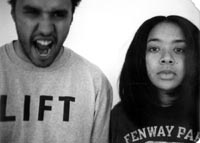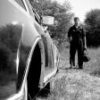
Second Time’s A Charm
Written by Tiffany Patrick | Posted by: Anonymous
Filmmakers DeMane Davis and Khari Streeter head to Sundance this month with their feature film "Lift." Shot in Boston, "Lift" is Davis’ second film. His first, "Black & White & Red All Over," premiered in the Dramatic Competition at Sundance in 1997. Yet despite such a track record with the prestigious film festival, "getting into Sundance," says Davis "is and will always be a daunting task." Tiffany Patrick recently caught up with Davis and discussed "Lift," filmmaking and, what else, Sundance.
Tiffany Patrick: Congratulations on going to Sundance. First, tell us about yourself and about "Lift."
DeMane Davis: Born and bred in Roxbury, I’m a writer turned screenwriter/director. I became an advertising copywriter (in 1987) and met Khari Streeter (whom I co-direct with) at an ad agency in 1993. To pay the rent, I direct commercials, which also gives me the chance to hone my skill and work with a variety of casting directors, talent, DPs and other crew.
TP: Is "Lift" your first film?
Davis: "Lift" is my second feature film. Inspired by seeing four funeral programs on my niece’s wall, my first film was about Black on Black violence. "Black & White & Red All Over" premiered in Dramatic Competition at Sundance in 1997 and went on to play in New Directors/New Films in New York and at the Edinburgh Film Festival.
TP: Who wrote it?
Davis: I wrote "Lift." The story is by both Khari and I, and we co-directed the film. We were fortunate in being selected to attend both the Sundance Filmmakers and Screenwriter’s Labs in the summer of 1997 where you get to shoot a few scenes from the script (on video) with a small crew and cast, edit them with an editor and then show them to other lab directors (Sundance Fellows I think they’re officially called) and to Creative Advisors. The scenes we did were shown to Denzel Washington, Kathy Bates, Steve Rosenblum, Alison Anders; basically an incredible list of people who then sit down and tell you what they thought about your work and how they approach their own. The screenwriter’s lab brings in writers like Millard Kaufman, Susan Shilliday, Alice Arlen and Charles Fuller. You get to spend four hours with each of them talking about the script. Attending the Labs was one of the most amazing gifts I’ve ever been given. I still refer to my 80 pages of notes from the month I spent out there.
TP: What is the "Lift" about?
Davis: "Lift" is about a girl who has a fractured relationship with her mother and boosts (shoplifts) to give her clothes in an attempt to reach out to her because materialism is what her mother and the community around her responds to and accepts.
TP: Where was it shot?
Davis: We were lucky to be able to shoot "Lift" here in Boston where the story is actually set. We shot in April and May (24 days) and had almost as many interiors as exteriors. Some locations were DKNY on Newbury Street, 100 Summer Street where our Production Designer, James Chinlund, turned a office lobby into a department store and, of course, Roxbury, where the main character lives.
TP: Is New England filmmaker friendly?
Davis: Early on, there was talk of filming "Lift" in Baltimore where it’s cheaper. In the end I’ll do what I have do to get the film made, but I wanted Boston before the Baltimore location photos came in. There are a millions stories here.
TP: Who is in it?
Davis: We cast "Lift" in both New York (through Kerry Barden) and Boston (through Kevin Fennessy.) Kerry Washington ("Our Song," "Save The Last Dance") plays Niecy, the main character. Her mother, Elaine, is played by Lonette McKee ("He Got Game," "Jungle Fever," "Cotton Club"). Barbara Montgomery (from TV’s "Amen") plays Niecy’s grandmother and Jacqui Parker and Naheem Allah play Niecy’s Aunt Lily and Uncle Michael. We also had Samantha Brown ("Big Daddy," "New Jersey Drive") as Camille, Niecy’s best friend, Sticky Fingaz in a small role and Eugene Byrd ("White Boyz," "Dead Man," "Sleepers") as Niecy’s boyfriend.
The cast was absolutely superb. Kerry found us a great lead (she actually came in to read the role of Camille) and Kevin did an amazing job of filling every other role we needed, including Niecy’s Aunt and Uncle who are the moral foundation of the film.
TP: Where did you get funding to make "Lift"?
Davis: Our film was funded by Hart Sharp Entertainment who produced "Boys Don’t Cry" and recently "You Can Count On Me." We originally met them when we went to the Labs in ’97 and they were producing theatre and representing actors. Cathy Konrad (producer of "Girl Interrupted," "Copland" and the "Scream" trilogy) and Jim Mangold (writer and director of "Girl Interrupted," "Copland," and "Heavy") executive produced "Lift." Cathy shopped the script around initially and ultimately Hart Sharp stepped up when other companies said they "couldn’t see the poster." Hart Sharp has always called this an important, worthy film when no one else did. Cathy and Jim were instrumental in the development of the script, which we worked on together for almost a year before Hart Sharp came on board.
TP: What will you and co-director Khari Streeter be doing between now and January 18?
Davis: Donna Daniels PR has recently signed on to represent the film out at Sundance, so most of the time between now and then will be spent answering questions like these and figuring out how to best describe and talk about the film and the experience. It gets tough to condense; it’s so varied and intense. And, of course, we’ll finish timing the print, well, Don at Technicolor will, and the opticals will be finished. The mix was completed yesterday (12/19) at Digital Cinema in New York. I’d liken it to the Skywalker Ranch. I’ve never been, but it was just as good to me.
TP: Does getting into Sundance seem so daunting a task now?
Davis: Getting into Sundance is and will always be a daunting task. I actually just had the chance to take a good look at the other films in Competition and in American Spectrum and the Documentary category and can’t believe LIFT was selected. There are some incredible films out there. Hopefully I’ll get to see a lot of them.
TP: What do you plan to do while at Sundance?
Davis: I plan to see films, meet other filmmakers and hopefully, represent "Lift" the best way possible and help it find a distributor while we’re there. I also want to see how an audience sees this film, that’s a huge present to be given, to have an audience see it and relate to it and talk about it (we’ll do Q&A after each screening.) But the best thing to do out there, I think, is not forget to soak it in. Step back and see where you are and who is around you, look at the mountains and the sky and snow. It’s a rare thing to be there and observing it will help me not go too fast or get too caught up in the stress of trying to sell the film. It has to be enjoyed too.
TP: What is the best piece of advice that you have gotten about filmmaking?
Davis: Jim Mangold has said often that if a script is to be filmed, it has to be undeniable. You have to make it that way so that everyone who reads it can see, hear and feel it. "Lift" is about a young Black girl and her mother and the corrupt world around her, yet Jim, a white man, totally relates and responds to it. Making it undeniable means you’ve hit on a truth that resonates with people, regardless of who they are and where they’re from.
Second is something I learned from the Labs as well as Kim Pierce ("Boys Don’t Cry") who was my roommate out there and that is to stay open. As a writer and especially a director, you are the funnel through which the work will come. Spielberg has said, ultimately we’re all working out our demons and sharing them with an audience to make them not so scary or traumatic. A film has to touch you before it can touch anyone else and that means allowing your life and experience to become a part of the film. The trick is not to be afraid of that and let it come. Even if the script never gets filmed or the notes you make never become a script, you’re learning about yourself and that (at least to me) is the most important thing.
TP: I understand that "Lift" has won an award. Tell us about it?
Davis: In 1998 "Lift" was selected from over 60 scripts as the U.S. Winner of the Sundance/NHK Filmmakers Award. The NHK reads and judges scripts and then supports them by offering Asian territories. Past winners include "Smoke Signals" and "Central Station." "Lift" winning is an even bigger deal when you consider the fact that most of the films produced in the States and sold overseas are big budget action films and rarely Black films at all, let alone dramas. You need a star to sell over there but even a film like "The Preacher’s Wife" didn’t do that well. Selling the territories beforehand made "Lift" more attractive to potential producers.
The 2001 Sundance Film Festival kicks off January 18 in Park City, Utah and runs through January 28. For more information log on to www.sundance.org.










